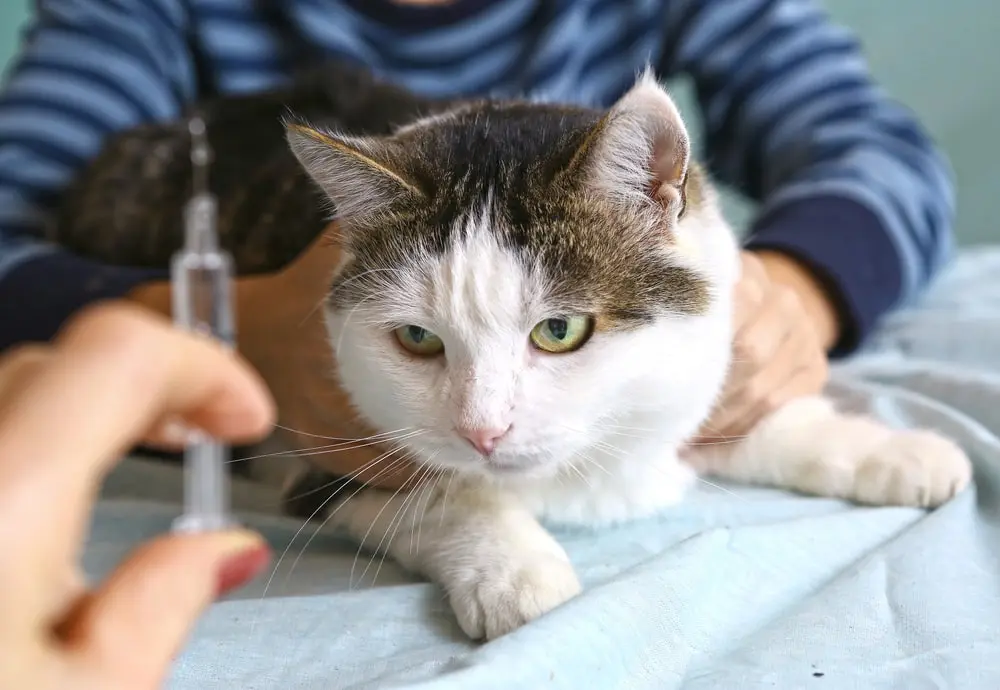
While diabetes can be controlled in some cats through a change of diet and weight loss, unfortionatly most diabetic felines cannot get by with lifestyle changes alone. This is where insulin comes in.
Being the most effective treatment in cats, injecting insulin compensates for the decreased effectiveness of the insulin in the cat’s body. This would mean twice-daily insulin injections for your cat.
The cost of insulin treatment for cats is $25 to $75 per month.
In addition to insulin treatment, there are regular diagnostic costs associated with feline diabetes. These costs include glucose monitoring and regular health checks.
You can expect to pay $700 to $1,200 per year to adequetly monitor a diabetic cat.
Insulin Injections
- Insulin
Although human insulin can be used, veterinary insulin is usually more cost-effective. Vetsulin is sold in 10 ml containers for $50 to $60 and 2.7 ml containers for $20 to $30.
Once opened, a bottle of Vetsulin will only last 40 days.
Most diabetic cats will not need more than 10 ml of insulin within a 40 days. Mildly diabetic cats may not even need 2.7 ml of insulin over the same period.
Two U-40 syringes per day are needed to give insulin. Generic syringes can cost as low as $15 per a 100 count box, while Vetsulin brand syringes cost about $50 per a 100 count box.
The smaller 2.7 ml container of Vetsulin is designed to be used in an injection pen. The one-time cost of this pen is around $150.
Many pet owners find it easier to use than traditional diabetes syringes. Needles for this pen will cost $50 per a 100 count box. They will need to be used twice daily.

- Additional Treatments
Spaying or neutering can help manage diabetes in cats. The costs for these procedures are $50 to $100 for neutering and $100 to $200 for spaying.
The majority of diabetic cats are overweight. Follow your veterinarian’s advice for a weight loss plan.
Prescription diets are typically recommended for diabetic cats. Diet can help maintain weight and glucose levels.
These are specialized diets for diabetic cats which have a highly specific carbohydrate content. “Hill’s m/d” food is a commonly perscribed food for diabetic cats. The price is roughly $25 for a 4-pound bag or $40 for 24 cans.
If you choose a non-prescription diet, choose a low-carbohydrate food. Canned food is typically better than dry food in this regard. Also, make sure to keep your cat a healthy weight.
- Insulin Dosing and Monitoring
To find the correct insulin dose for cats, they will need a glucose curve test. This can be done at home or in a veterinary hospital.
Your cat will eat their regular meal and recieve their insulin injection. Blood will be drawn every 2 hours for glucose measurement.
Glucose curves performed at home usually give better results as your cat is less stressed. An in-home test can be done with the purchase of a pet glucose meter for roughly $60. A veterinary technician can teach you how to use one.
Most owners don’t want to draw their cat’s blood and opt for an in-clinic test. This test costs $60 to $150 and your cat will need to stay at the hospital for the day.
The glucose curve test will need to be repeated every three weeks until the correct insulin dose is determined. Most cats will initially require two or three glucose curve tests.
The insulin dose will need to be rechecked every 3 to 6 months by various methods. Another glucose curve test can be performed.
Alternatively, a fructosamine blood test can be done. This is a simple one-time blood draw and costs $60 to $100. The results will show the average blood glucose in the past few weeks.
Urine test strips can also be used to keep an eye on your cat’s diabetes. Glucose in the urine indicates that the insulin dose needs to be increased.
Ketones in urine indicate poorly managed diabetes as well. When done as a stand-alone test, a urine test strip at the veterinarian will range from $10 to $70.
The veterinarian can obtain a urine sample, however, providing one from home can offer significant savings. There are also significant savings when bundled with other diagnostics.
Along with regular checks on insulin dosing, a diabetic cat will need frequent health checks. It is recommended to have an exam, blood chemistry, CBC and urinalysis every six months.
This will cost $225 to $330, apart from the cat diabetes costs discussed above. Your veterinarian will likely require these checks at least anually to continue insulin treatment.
